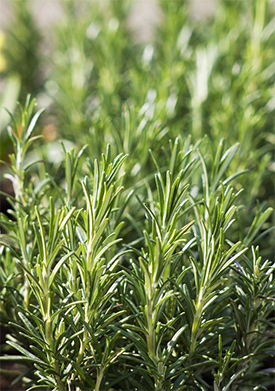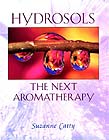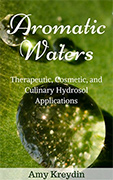Rosemary Hydrosol
Rosemarinus officinalis

Rosemary Hydrosol is beautifully aromatic and herbaceous.
It is invigorating, but not intensely so. It helps gently support the respiratory system. I love using it in facial, body and room mists to help feel refreshed and to support mental focus.
Several chemotypes of Rosemary Essential Oil exist. It can be difficult to procure reliable information regarding the chemotype or compositional properties of the rosemary used in the distillation of Rosemary Hydrosol, even when sourcing from artisan distillers that distill the hydrosol as a primary product.
Look to the citations from hydrosol experts Suzanne Catty, Jeanne Rose and Len and Shirley Price in the Uses and Applications section below for information on the potential benefits of Rosemary Hydrosol.
Botanical Name
Rosemarinus officinalis
Aromatic Strength
Medium
Shelf Life
Up to 2 years if stored properly (refrigeration is recommended).
Reported Properties, Uses and Applications
Suzanne Catty reports that Rosemary Camphor Hydrosol is energizing and stimulating. It is a mild circulatory stimulant and use helpful for arthritis, rheumatism and gout. She states that it's a noteworthy antioxidant. It is suitable for normal and oily skin and as with Rosemary Essential Oil, it is useful for hair care and combating hair loss. [Suzanne Catty, Hydrosols: The Next Aromatherapy (Rochester, VT: Healing Arts Press, 2001), 124.]
Len and Shirley Price report that the Rosemary Hydrosol that they analyzed consists of 16-18% alcohols, 54-56% ketones, 12-13% esters (these ranges do not include the water present in the hydrosol) and possesses the following properties: "analgesic, anticoagulant, antifungal, anti-infectious, anti-inflammatory, antispasmodic, antiviral, bactericidal, balancing, calming, cicatrizant, decongestant, digestive, expectorant, lipolytic, mucolytic, sedative, stimulant." [Len Price and Shirley Price, Understanding Hydrolats: The Specific Hydrosols for Aromatherapy: A Guide for Health Professionals (London: Churchill Livingstone, 2004), 137.]
Jeanne Rose adds that Rosemary Hydrosol revitalizes skin, restores energy and is useful for tired feet. [Jeanne Rose, 375 Essential Oils and Hydrosols (Berkeley, CA: Frog, Ltd, 1999), 174.]
Safety Information
Read AromaWeb's Hydrosol Safety Guidelines.
The hydrosol information and safety precautions provided within this area are intended for educational purposes only. Neither AromaWeb, LLC nor its founder take responsibility for how you use the information provided.
Helpful Sources of Information About Rosemary Hydrosol

Hydrosols: The Next Aromatherapy
Author: Suzanne Catty

Understanding Hydrolats: The Specific Hydrosols for Aromatherapy
Authors: Len Price and Shirley Price

375 Essential Oils and Hydrosols
Author: Jeanne Rose

Aromatic Waters: Therapeutic, Cosmetic, and Culinary Hydrosol Applications
Author: Amy Kreydin
